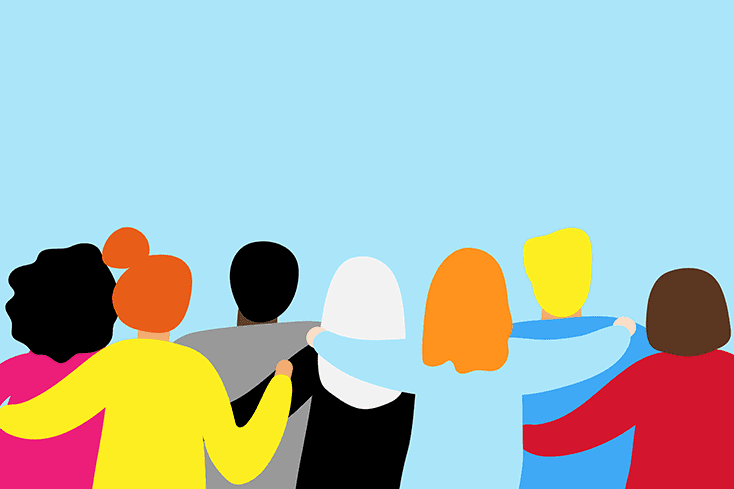December 13, 2021
By Rebecca Coursey

As I reflect on my recovery story, I always come back to the ways in which NAMI facilitated my progress. In 2006, when I was 26 years old, I was diagnosed with bipolar I disorder. For a long time after my diagnosis, I felt alone — like I was the only one on the planet struggling. But when I found NAMI, and became open and honest about my journey, I found my community. After that, things began to fall into place in my life.
Four years after my diagnosis, things were seemingly going well. I had weathered many medication changes and reached a point of stability. I was even working as a preschool teacher’s aide because I wanted to help people in some way.
Then, my little sister overdosed in 2010. I fell apart; I mourned in every waking moment and even in my dreams. I didn’t want to live, but also knew the devastation that taking my life would cause my family.
A year later, I woke from a nightmare. I sat up in bed with a spiritual pull on my heart. I suddenly felt as though I needed to do something to make a difference. I began researching the next day for support groups and programs to help people with mental illness.
I contacted the local community mental health center, and they said they would allow me to host support groups in their building. However, I felt I needed to be better educated. Someone suggested I look up the National Alliance on Mental Illness (I wish I remember who so I could thank them), but after finding a group in Bowling Green, I nervously attended a NAMI Connections meeting. Just introducing myself caused heart palpitations because I rarely interacted with people outside my family.
In the group, I met successful people who lived with bipolar disorder: People with master’s degrees in social work, therapists and people who volunteered as peer support specialists. I felt like I had finally found my community. I became more involved and volunteered to be on NAMI Bowling Green’s Board. I learned about programs and completed a training that would allow me to facilitate my own NAMI Connections groups.
After becoming a board member, a new friend introduced me to the idea of becoming a peer support specialist. I received my certification in July 2014, and soon after, I began working as the first paid peer specialist for Lifeskills, a community mental health center in Bowling Green. In 2014, I also finished my bachelor’s degree from Western Kentucky University. Getting my degree was a goal I wasn’t sure I could achieve, but I did it, and it was one of the proudest moments of my life.
I left Lifeskills after two years to work at a state psychiatric hospital; I wanted to go back to working in the community and seeing people go from struggling to living independent, self-directed lives. I’ve been there since 2017, and now I get to see others’ recovery firsthand. It is rewarding and valuable work and gives me a purpose.
A decade or so ago, I was hopeless. I had no friends or social network, and I didn’t want to live. Now, because of NAMI, my life is completely different. I have friends and a community. I get to feel like I make a difference.
I am now the lead Family Advocate for the state of Kentucky, which promotes supportive employment programs at community mental health centers across the state. I design, write for and edit the NAMI Kentucky newsletter. Recently, I was even named Interim Chair of Bowing Green NAMI, the affiliate I first walked into years ago as a scared and downtrodden person without hope.
Now, I get to help make decisions to grow and expand NAMI Bowling Green. I co-facilitate a NAMI Connections group in a new affiliate in Butler County. I continue to work as a peer support specialist.
Now, I find joy in every day. Recovery from a mental illness is not linear, and is often a struggle, but that won’t derail my progress. I may have an episode, but I have NAMI, my friends and family, and my coworkers to support me.
Of course, I wish my little sister was still with me, but I can’t change the past. Instead, I do what I can to help others know that there is always hope. I’ll hold hope for them until they find it on their own.
Rebecca Coursey is the Chair of NAMI Bowling Green and cofacilitates two NAMI Connections support groups. She is a graduate of Western Kentucky University with a degree in English Literature and Writing. Rebecca will be co-facilitating a support group for students of WKU through the NAMI On Campus program in 2022. She is also a mother of two young men. She lives in Spa, Ky., on a farm with her husband, Kevin, who is her biggest supporter.
We’re always accepting submissions to the NAMI Blog! We feature the latest research, stories of recovery, ways to end stigma and strategies for living well with mental illness. Most importantly: We feature your voices.
LEARN MORENAMI HelpLine is available M-F, 10 a.m. – 10 p.m. ET. Call 800-950-6264,
text “NAMI” to 62640, or email. In a crisis, call or text 988 (24/7).